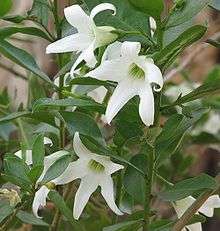Anthocercis
| Anthocercis | |
|---|---|
 | |
| Anthocercis viscosa | |
| Scientific classification | |
| Kingdom: | Plantae |
| (unranked): | Angiosperms |
| (unranked): | Eudicots |
| (unranked): | Asterids |
| Order: | Solanales |
| Family: | Solanaceae |
| Genus: | Anthocercis Labill. |
| Species | |
|
See text | |
Anthocercis, commonly known as tailflower, is a genus of shrubs which are endemic in southern temperate Australia with the center of distribution in the South West Botanical Province of Western Australia.[1] All species of Anthocercis contain tropane alkaloids, and have occasionally caused poisoning in children or suspected of poisoning stock.[1] Anthocercis is known as the only Solanaceous plant known to produce resin compounds on glandular trichomes.[2]
Taxonomy
The genus, which is placed within the Solanaceae family, was first formally described by botanist Jacques Labillardière in Novae Hollandiae Plantarum Specimen, Vol. 2: 19 (1806). The type species of the genus is Anthocercis littorea Labill.
Anthocercis lies in the subfamily Nicotianoideae. The genus is considered to be part of the tribe "Anthocercideae," but the monophyly of this grouping has been called into question. The species within Anthocercis, however, form a monophyletic group, and lie sister to all other genera of the "Anthocercidoid clade.".[3]
Etymology
Anthocercis; from the Greek anthos (a flower) and kerkis (a ray), in reference to the narrow corolla-lobes.
Species
- Anthocercis angustifolia F.Muell.
- Anthocercis anisantha Endl.
- Anthocercis aromatica C.A.Gardner
- Anthocercis fasciculata F.Muell.
- Anthocercis genistoides Miers
- Anthocercis gracilis Benth. (Slender Tailflower )
- Anthocercis ilicifolia Hook. (Red Striped Yellow Tailflower)
- Anthocercis intricata F.Muell.
- Anthocercis littorea Labill. (Yellow Tailflower)
- Anthocercis microphylla F.Muell. (Small-leaved Anthocercis)
- Anthocercis odgersii F.Muell. (Woolly Anthocercis)
- Anthocercis racemosa F.Muell.
- Anthocercis sylvicola T.Macfarlane & Wardell-Johnson[4]
- Anthocercis tenuipes Gand. (Putative hybrid between Duboisia myoporoides R.Br. & Cyphanthera scabrella (Benth.) Miers)[1]
- Anthocercis viscosa R.Br. (Sticky Tailflower)
References
Notes
Bibliography
- George, Alexander S.; Robertson, Sir Rutherford; Briggs, Barbara G. eds. et al., (1982): Flora of Australia. Volume 29: Solanaceae, pp. 6 – 13.
- Langenheim, Jean H. (2003): Plant Resins, p. 95.
- Macfarlane, T.D.; Wardell-Johnson, Grant, (1996): Anthocercis sylvicola (Solanaceae), a rare new species from the tingle forests of Walpole, south western Australia, Nuytsia, Vol. 11, no.1, p. 71-78 : ill.
External links
- "Anthocercis Labill.". Australian Plant Name Index (APNI), IBIS database. Centre for Plant Biodiversity Research, Australian Government.
- "Anthocercis". FloraBase. Western Australian Government Department of Parks and Wildlife.
